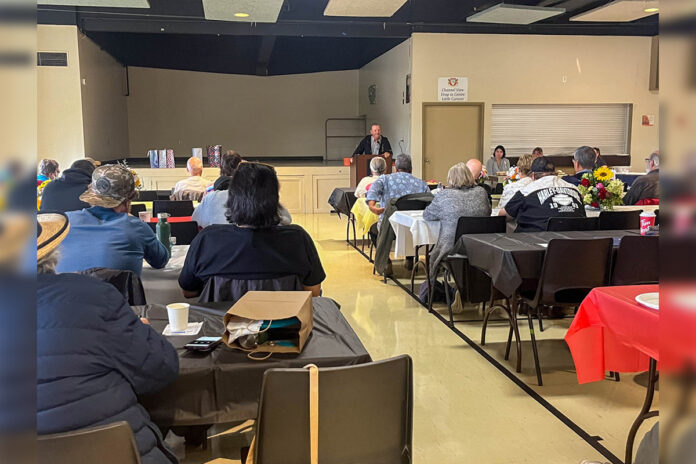MANITOULIN—It wasn’t long ago—just over two years, in fact—that fewer than 14,500 people on Ontario’s social assistance programs were experiencing homelessness. Today, that number has nearly doubled. Over 26,500 individuals are without a stable place to call home, a haunting reality reflected in the latest provincial data.
As cities and towns across Ontario scramble to cope with this surge, seeking help from the provincial government, Premier Doug Ford has remained resolute. His message is blunt and clear: if you’re healthy, you need to work.
On a recent Monday, standing before a crowd, Premier Ford didn’t mince words when discussing people living in encampments. “Bottom line, if you’re unhealthy, I’ll take care of you. But if you’re healthy, get off your A-S-S and start working,” he declared, his voice brimming with frustration.
The premier’s sentiment might ring hollow to those on the frontlines of Ontario’s homelessness crisis, advocates like Diana Chan McNally, a crisis worker in Toronto. The cost of living—soaring housing prices, relentless inflation—has been rising for years, while social assistance rates have barely shifted. It’s not a matter of simply finding a job, Ms. McNally explains; it’s a matter of survival in a system that offers too little and demands too much.
Imagine this: you lose your home, and along with it, you lose your shelter allowance. For someone on Ontario Works (OW), that’s $390 gone—nearly half of their monthly benefits. For those on the Ontario Disability Support Program (ODSP), it’s $582, a crushing blow. And with the average rent for a studio apartment in Ontario at $1,837 a month, those numbers feel like a bad joke.
“You’re lucky to be living in a rooming house,” says Trevor Manson, co-chair of the ODSP Action Coalition. “It’s not a bunch of healthy people sitting at home, playing Nintendo, drinking beer all day.” His voice cracks, not with frustration but with exhaustion—exhaustion from watching too many people slip through the cracks of a safety net that is too frayed to catch them.
In July of this year, the Ministry of Children, Community, and Social Services reported 26,553 cases of homelessness among OW and ODSP recipients. But behind each of those numbers lies a family, a person with a name, a history, and a desperate hope for something better. These are not just “cases” or “beneficiaries,” as the government labels them in its reports—they are people, often whole families, trying to navigate a world that feels indifferent to their plight.
Municipalities, overwhelmed by the weight of this crisis, have counted over 1,400 encampments in their communities, as tents and makeshift shelters spring up in parks and underpasses. The strain is palpable, yet the province and federal government continue to push the responsibility onto local governments, who are already struggling to manage addiction, mental health, and poverty within their borders.
Two years ago, during Ontario’s 2022 election campaign, social assistance rates were a hot topic. The Green and NDP parties promised to double ODSP rates if elected, and the Liberals offered a 20 percent increase. The Progressive Conservatives, under pressure, vowed a modest five percent raise to ODSP rates—about $58 more per month—eventually tying it to inflation.
Premier Ford stood by his government’s actions, stating, “By tying ODSP increases to inflation, our government is helping vulnerable Ontarians keep pace with the rising costs of life’s essentials.” Yet, despite these words, Ontario Works rates remain untouched, and for many, the small increase feels like a drop in a vast ocean of unmet needs.
For those on Ontario Works, the barriers to moving onto ODSP are immense. It’s not just about having a disability; it’s about proving it—an arduous process made even more difficult by a healthcare system where finding a doctor to sign off on forms feels like a Herculean task. “You can’t walk into a clinic with stacks of forms,” Mr. Manson explains. “They just don’t have time for that.”
At the heart of this story is a fundamental question: how do we, as a society, care for our most vulnerable? Ford’s words, echoing from podiums, might resonate with some, but for those living through the realities of homelessness, the message feels cold. It’s not laziness keeping people from work, as Krista Carr of Inclusion Canada points out. It’s hunger, insecurity, the crushing weight of not knowing where you’ll sleep tonight.
So as Ford urges people to “get off their A-S-S,” the reality for thousands of Ontarians is that they’re not sitting idle. They’re surviving—often just barely—on a system that wasn’t built for their success, but instead seems designed to keep them exactly where they are: struggling, invisible, and unheard.






